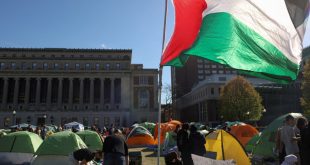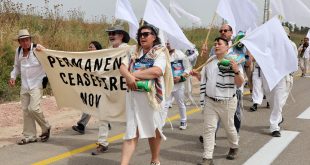GAZIANTEP, Turkey — Rescue workers dug through rubble on Tuesday to find survivors of the most powerful and deadly earthquake to hit Turkey and Syria in decades, toiling in a vast and desperate search complicated by geography and geopolitics, freezing weather and the sheer scope of the disaster.
Even as they struggled to free people from the tombs of metal, concrete and wood where apartments and office buildings once stood, the death toll climbed. At least 7,700 people were reported dead, officials said.
The crews found reason for hope, rescuing more than 8,000 people in Turkey alone. But they were also working against time as temperatures sank below freezing. Survivors, many barefoot and in sleeping clothes, huddled around bonfires of wreckage to stay warm.
Rescue teams shoveled snow as it piled up on the debris, searching for the injured and trapped. In Gaziantep, a Turkish city near the epicenter of the 7.8-magnitude earthquake, which struck on Monday, four members of one family were painstakingly rescued, one at a time. In northwest Syria, residents found an infant crying in the rubble, seemingly the only survivor of a building collapse and who had spent hours in the cold.
“We have to fight against the weather and the earthquake at the same time,” said the Turkish vice president, Fuat Oktay, calling the quake the “disaster of the century.”
In Turkey, the rescue efforts spanned 10 provinces and hundreds of miles, from the sprawling, ancient city of Gazientep to rural towns and villages where roads buckled so badly they could not be used. The Turkish navy sent ships with heavy machinery, blankets, generators and food, and the national emergency management agency dispatched more than 16,000 workers, 3,000 machines and 600 cranes to heave debris.
Many of the rescue workers were volunteers who had no plan other than to help out where they could. “We are here because of our conscience and because we always side with the weak ones,” said Mehmet Bodur, 55, in the Turkish city of Sanliurfa.
“We are face to face with one of the biggest disasters ever for our region,” President Recep Tayyip Erdogan of Turkey said in a televised address from the capital, Ankara, as he declared a three-month state of emergency in the provinces affected.
In Syria, where more than a decade of civil war had already created a humanitarian crisis, rescue efforts were hampered by the location of the quake zone, which includes government- and opposition-controlled lands.
Deadly Quake in Turkey and Syria
A 7.8-magnitude earthquake on Feb. 6, with its epicenter in Gaziantep, Turkey, has become one of the deadliest natural disasters of the century.
“People are driving bodies to us in their personal cars,” said Nehad Abdulmajeed, a doctor near the city of Idlib, Syria.
“We have cried over children, who lived through this war and are now dead for no reason,” he said.
“I believed that maybe I had seen everything,” he added, “but these are the most tragic days that I have seen in my entire life.”
Syria cannot receive direct aid from many countries because of Western sanctions against President Bashar al-Assad’s government. The only United Nations-approved crossing for aid between Syria and Turkey — a lifeline for opposition-held areas in the north — was closed because of earthquake damage, U.N. officials said, posing serious logistical obstacles to relief efforts.
But hopes that aid could reach rebel-controlled areas by other routes were piqued by a statement on Tuesday by Syria’s foreign minister, Faisal Mekdad. Pleading for international support on Lebanese TV, he said his government was ready to allow aid for quake victims to enter all regions, provided the aid did not reach armed terrorist groups.
Every problem seemed to be compounded by another. A huge fire broke out on Tuesday at one of Turkey’s major ports, disrupting the arrival of supplies. An economic crisis had already been battering many Turkish families, meaning resources were increasingly scant for months before the earthquake.
In Adana, about 100 miles from the epicenter in southern Turkey, the terrain and the weather had delayed many rescue workers from even reaching the city. Snow had closed the mountain highway connecting Adana and eastern Turkey, forcing teams to take the longer coastal route.
In Gaziantep, public spaces were filled with people whose homes had collapsed, entirely or partly, and those who had fled because they were still in shock or frightened that their homes might no longer be safe.
They camped out and tried to stay warm among piles of snow. Some families took turns in their cars, just to get out of the wind. Others erected simple tents, hitching blue tarps to fences. On some streets, crowds gathered around oil drums where men lit wood fires, smoking and holding out their bare palms to keep warm.
At least 150,000 people in Turkey have been left homeless by the earthquake and its aftershocks, which caused about 6,000 buildings to collapse, an official with the International Federation of the Red Cross told reporters in Geneva. Around 23 million people in the region were likely in need of aid, World Health Organization officials said, citing figures provided by the Pacific Disaster Center, a disaster management organization.
More aftershocks remained a “substantial” risk, Dr. Rick Brennan, the regional emergency director of the W.H.O.’s Eastern Mediterranean office, said in an interview. He said that because of poor water supplies and sanitation infrastructure in parts of Syria, the earthquake could aggravate existing outbreaks of cholera and measles.
Mr. Erdogan’s declaration of a state of emergency raised some concerns in Turkey; Turkish opponents and Western officials have accused him of pushing the country toward autocracy over decades in power. But analysts said the decision made sense, given the scale of the disaster. The emergency period is set to end shortly before major elections in May, a vote that could be shaped by how Mr. Erdogan responds to the earthquake.
Time was already running out for the many people still believed to be trapped in collapsed buildings.
The death toll is expected to continue to rise by the “thousands,” W.H.O. officials said Tuesday. By late Tuesday, the toll in Turkey had risen to 5,434, according to the national emergency management agency, AFAD. In Syria, at least 1,872 people are dead, according to the state health ministry and the White Helmets relief group.
News of the living and the dead slowly, inevitably, reached relatives in both countries.
Before her plane took off from Istanbul for Sanliurfa, a city in southeastern Turkey near the edge of the earthquake zone, Tugce Kocak, 38, started sobbing as she talked on the phone. Her husband had managed to get on an earlier flight carrying aid, and had called her from the pile of rubble that had been her family’s apartment.
“They are dead,” she said of her brother-in-law and one of his children. Her husband wasn’t sure if the other three family members there had survived.
The family was living in a new residential complex of nine buildings, nine stories each, entirely collapsed. Rescue teams arrived at the site a full 24 hours after the quake, Ms. Kocak said, and only after a relative had called local emergency officials repeatedly.
There were not enough rescue teams, and not enough equipment, to save her brother-in-law and the child, she said.
“My husband heard their voices until 7 p.m., saw their arms and legs,” she said. “Then they all became silent.”
Safak Timur and Ben Hubbard reported from Gaziantep, Turkey, and Gulsin Harman from Istanbul. Reporting was contributed by Raja Abdulrahim, Jin Yu Young, Natasha Frost, Cora Engelbrecht, Anushka Patil, Vivek Shankar, Yonette Joseph, Farnaz Fassihi, Jenny Gross, Shashank Bengali, Nick Cumming-Bruce, Cassandra Vinograd, Matt Surman and Alan Yuhas.
 Top Naija News: Nigerian News, Breaking News Nigeria and World News Top Naija News is a daily news publication in Nigeria, delivering the latest breaking news in Nigeria and around the world.
Top Naija News: Nigerian News, Breaking News Nigeria and World News Top Naija News is a daily news publication in Nigeria, delivering the latest breaking news in Nigeria and around the world.


